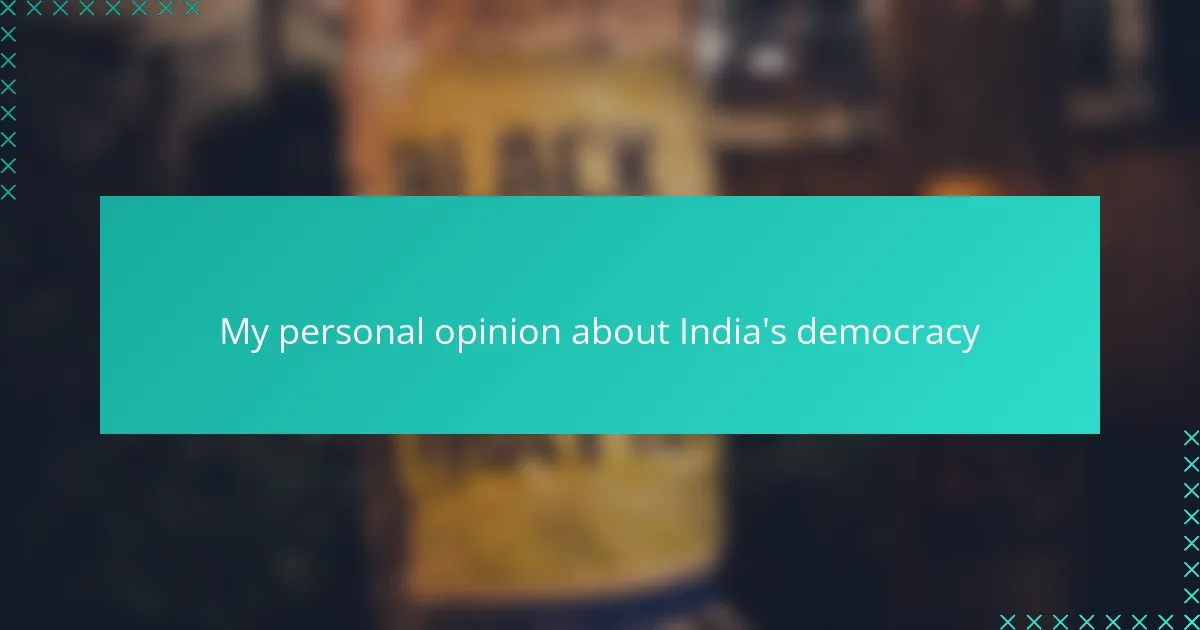Key takeaways
- Democracy is a dynamic, evolving practice that differs across cultures and requires understanding beyond formal institutions.
- India’s federal structure and parliamentary system enable diverse voices, though challenges like political corruption and social divisions persist.
- Democratic engagement empowers marginalized communities but also highlights the need for greater equality and access to education.
- Strengthening democracy involves enhancing civic education, transparency in governance, and fostering inclusive dialogue among diverse populations.
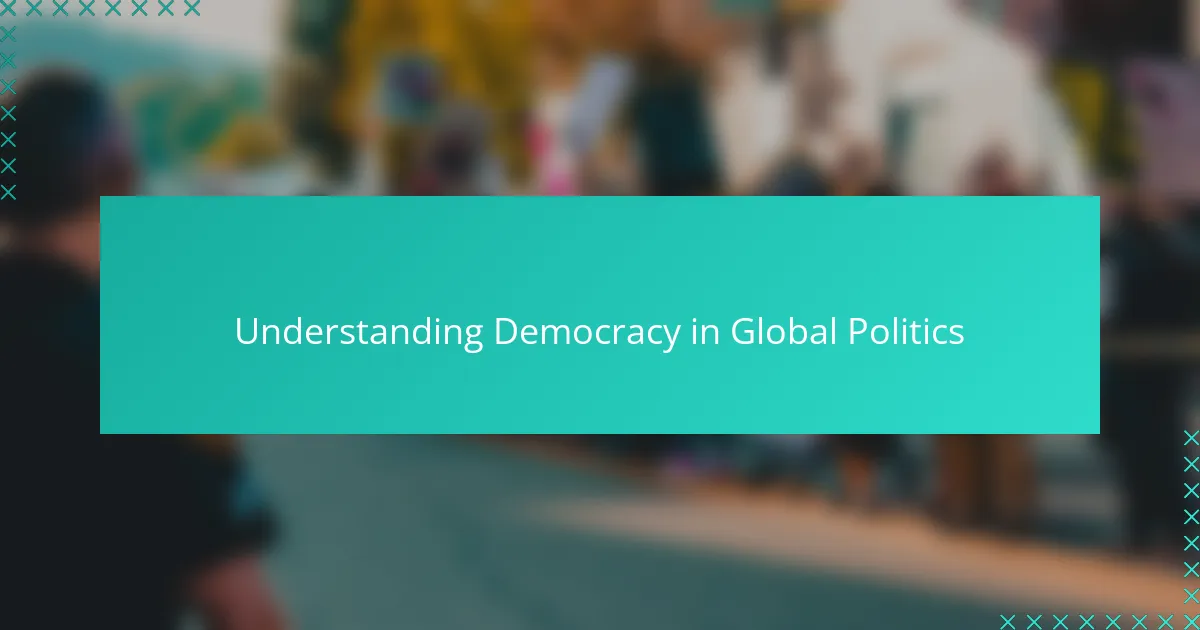
Understanding Democracy in Global Politics
Democracy, at its core, is the heartbeat of global politics—a system where the voice of the people ideally shapes the direction of a nation. But have you ever wondered how this concept translates differently across countries with diverse histories and cultures? From my experience, it’s fascinating to see democracy not as a one-size-fits-all model but as a living, evolving practice influenced by unique social and political landscapes.
When I first delved into global political systems, I was struck by how democracy’s promise of freedom and participation can sometimes contrast sharply with the realities on the ground. It made me question: Is democracy merely a set of institutions, or is it something deeper, embedded in the collective spirit of the people? This reflection helped me appreciate why understanding democracy requires looking beyond elections and governance structures to the daily experiences and aspirations of citizens worldwide.
Global politics challenges us to rethink democracy beyond our familiar frameworks. I often find myself asking whether true democratic engagement happens only within formal mechanisms or if it also thrives in informal spaces where people express their rights and opinions. This broader perspective reminds me that democracy’s strength lies in its ability to adapt and resonate with the values and voices of diverse populations everywhere.
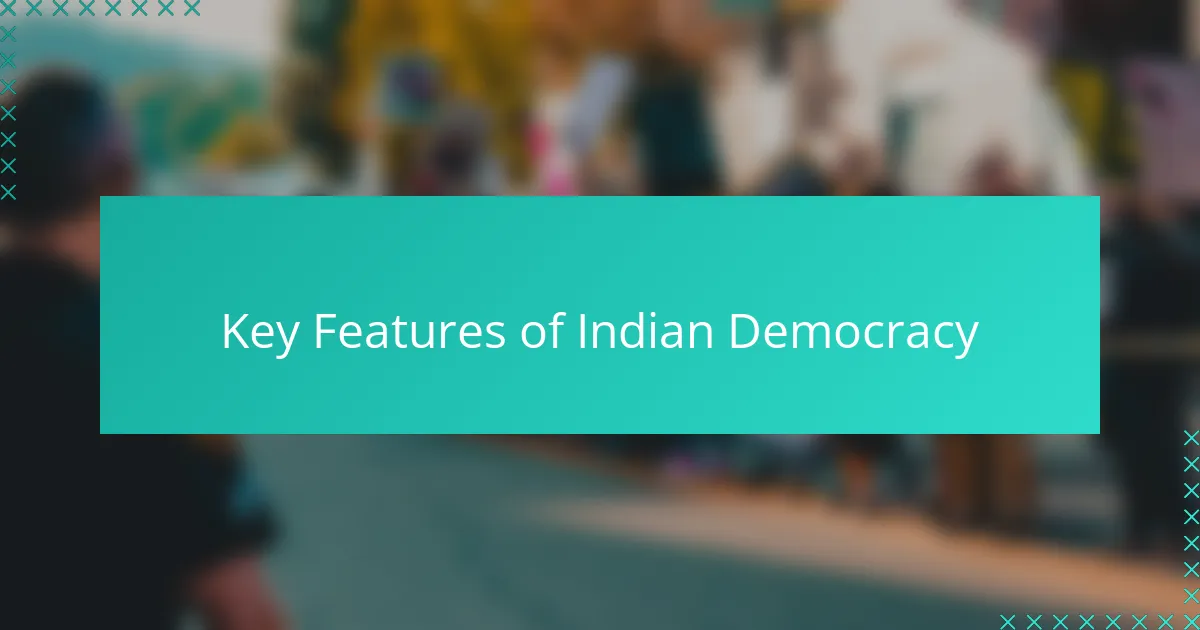
Key Features of Indian Democracy
India’s democracy is remarkable for its sheer scale and diversity; after all, it is the world’s largest democracy with over a billion people from countless ethnic, linguistic, and religious backgrounds. I often marvel at how this mosaic manages to sustain a democratic system where every voice matters, at least in principle. Isn’t it incredible that despite such complexity, elections are held regularly, showcasing a vibrant democratic culture?
One key feature I find particularly striking is the federal structure combined with a parliamentary system. This setup allows different states to have their own powers while being united under a central government. From my experience studying global politics, this balance between unity and regional autonomy is crucial in managing India’s vast differences, yet it also raises challenges like occasional tensions between state and central authorities.
I’ve also noticed how India’s democracy enshrines fundamental rights that protect minorities and promote freedom of expression. But it makes me wonder—how well do these rights translate into everyday realities? In my view, these protections are the backbone of democratic health, ensuring that democracy isn’t just about winning elections but also about safeguarding dignity and equal treatment for all citizens.
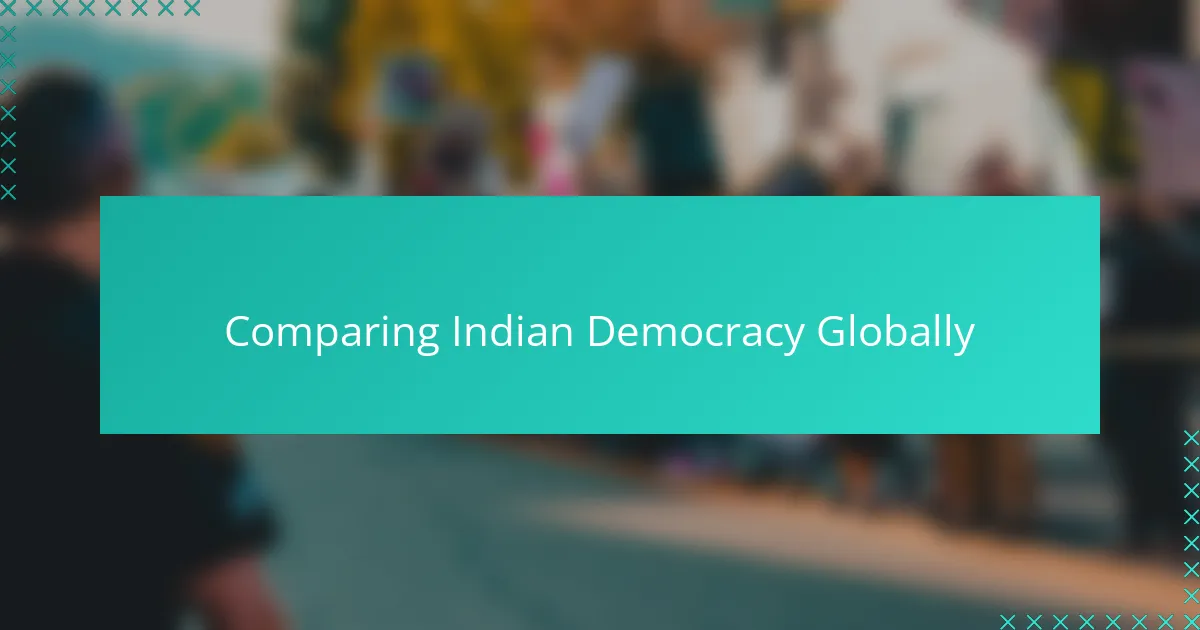
Comparing Indian Democracy Globally
When I compare Indian democracy to others around the world, what stands out to me is its extraordinary scale and complexity. Few other countries manage to conduct elections involving such a vast and diverse population with regularity and enthusiasm. It makes me reflect on the resilience required to keep a democracy functioning amid so many languages, cultures, and beliefs.
Yet, I sometimes wonder how India’s democratic model stacks up when looking at established democracies with longer uninterrupted traditions. While many nations boast stability and robust institutions, India’s democracy often feels like a dynamic experiment—constantly evolving, occasionally turbulent, but deeply rooted in the collective will. Does this volatility weaken democracy, or is it, in fact, a sign of a system that is alive and responsive?
From my perspective, the comparison also brings to light the unique challenges India faces, such as balancing regional aspirations with national unity. Unlike more homogenous democracies, India’s federalism is both a strength and a test, requiring constant negotiation and dialogue. This complexity makes me appreciate how democracy can take many forms and still serve the fundamental purpose of giving people a voice.
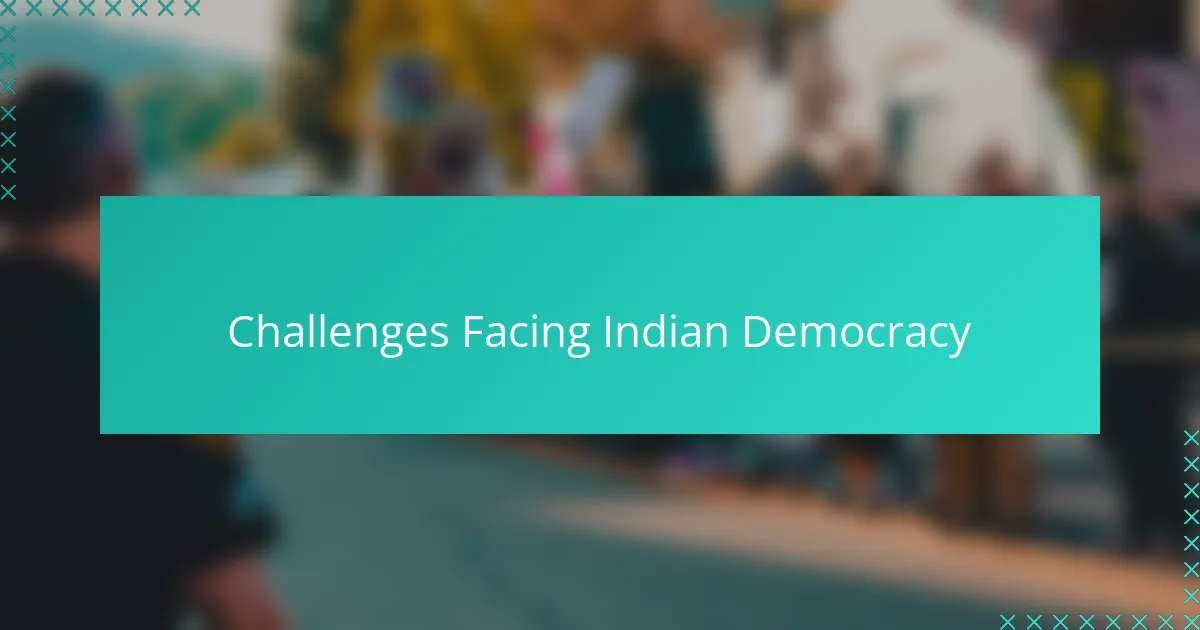
Challenges Facing Indian Democracy
One challenge that often comes to my mind is the persistent issue of political corruption. From what I’ve observed, corruption saps public trust and sometimes feels like an invisible barrier between citizens and their elected representatives. Have you ever considered how democracy thrives on accountability, and yet in India, maintaining that accountability remains a constant struggle?
Another difficulty lies in the growing communal and social divisions that have seeped into political discourse. I find it unsettling how identity politics can sometimes overshadow the spirit of democratic inclusion. It makes me question whether the very diversity that strengthens India’s democracy is also exploited in ways that threaten its unity.
Lastly, I think about the unequal access to education and resources that many face across the country. When people lack the tools to engage fully—like education or unbiased information—can democracy truly be representative? In my experience, addressing these gaps is essential if democracy in India is to fulfill its promise for all citizens, not just a privileged few.
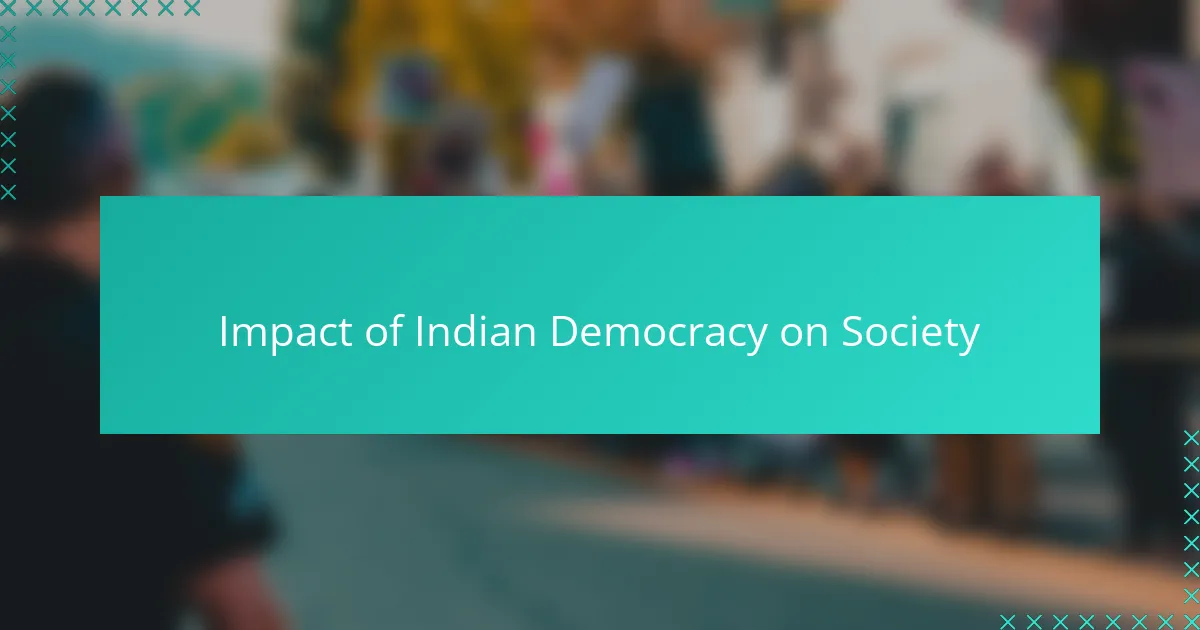
Impact of Indian Democracy on Society
Indian democracy’s impact on society is profound and multifaceted. I’ve seen how democratic participation has empowered marginalized communities, giving them a platform to voice their concerns and aspirations. Isn’t it remarkable how elections here aren’t just about politics but a celebration of diverse identities and stories coming to the forefront?
However, I’ve also noticed that this democratic vibrancy sometimes coexists with social tensions. For instance, while democracy promises equality, societal inequalities often persist, leading me to wonder how deeply democracy has transformed everyday life for the most vulnerable. Does democracy truly bridge these divides, or does it mirror existing fractures within society?
What strikes me most is how democracy in India continuously shapes social norms and public discourse. From grassroots movements to widespread debates, I’ve observed how democratic engagement encourages citizens to challenge traditions and push for change. This dynamic interaction between democracy and society, in my view, is both India’s greatest strength and its ongoing challenge.
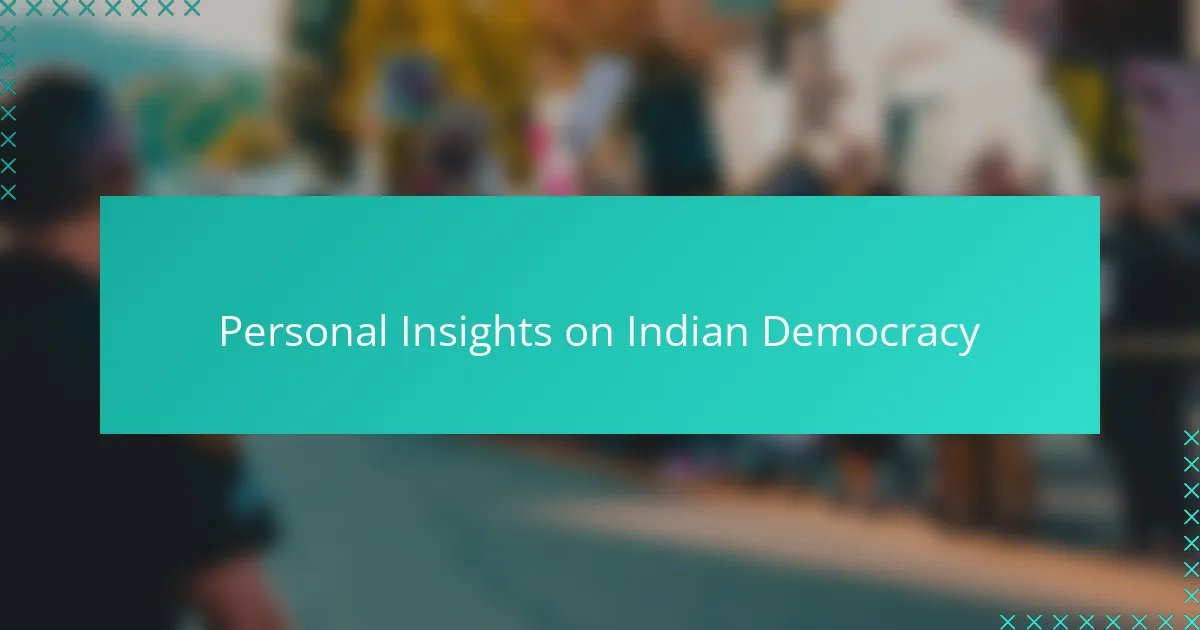
Personal Insights on Indian Democracy
India’s democracy fascinates me because it’s like watching a complex, ever-changing story unfold in real time. I recall witnessing a local election in a small town where people from different castes and backgrounds came together, showing an unmistakable hope that their voices matter. Isn’t that enduring spirit of participation what democracy truly embodies?
At the same time, I can’t help but feel a mix of admiration and concern. On one hand, the sheer resilience of Indian democracy is inspiring, given the diversity it embraces. On the other, I wonder how often this resilience masks deeper issues—like when political polarization seems to cloud the collective will. How do we reconcile these tensions without losing sight of democracy’s core promise?
Reflecting on my experience, I believe Indian democracy is a constant negotiation between ideals and realities. It reminds me that democracy isn’t a finished product but a work in progress shaped by millions of individual stories, struggles, and dreams. This fluidity keeps me engaged and hopeful, even when challenges seem daunting.
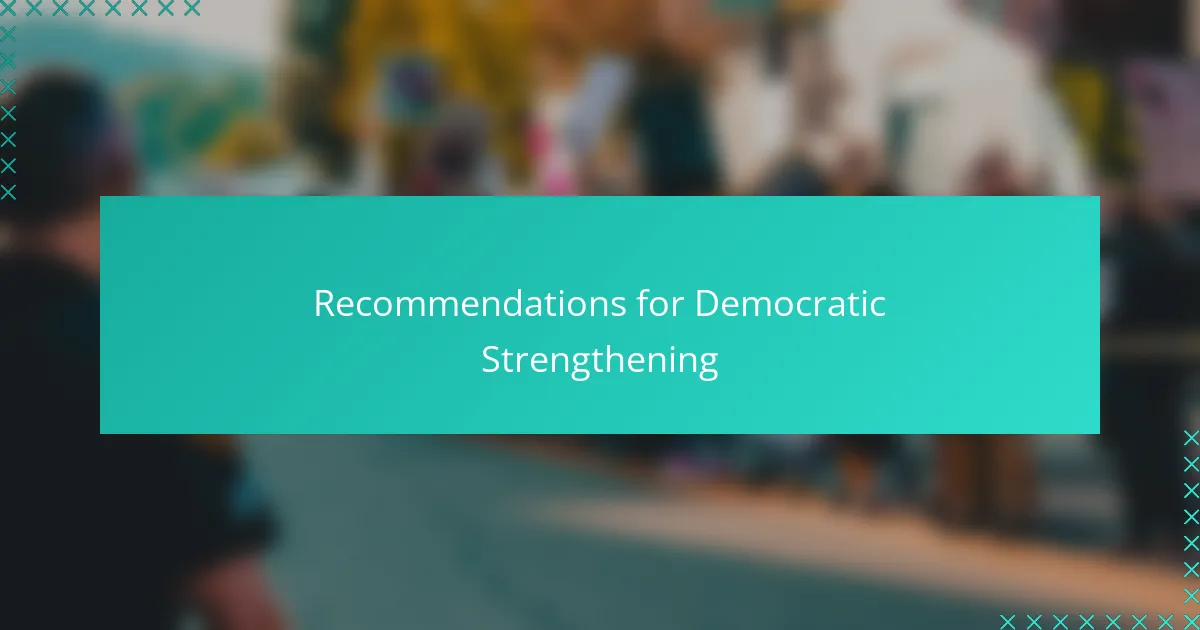
Recommendations for Democratic Strengthening
Strengthening democracy in India, I think, begins with deepening civic education. When citizens truly understand their rights and responsibilities, they become active participants rather than passive observers. I remember talking to young voters who felt empowered just by knowing how local governance functions—it’s that awareness that fuels meaningful democratic engagement.
Another crucial recommendation is enhancing transparency and accountability within political institutions. From my perspective, when leaders are answerable to the public in clear, measurable ways, trust is rebuilt. Don’t we all wish for a system where governance feels less opaque and more responsive? In my experience, even simple measures like accessible public records can make a huge difference.
Lastly, I believe nurturing inclusive dialogue across India’s diverse communities is key. Democracy thrives not despite differences but because of embracing them wholeheartedly. I’ve witnessed grassroots initiatives where people from varied backgrounds come together, finding common ground beyond politics. Could this kind of empathetic engagement be the cornerstone for India’s democratic future? It certainly feels that way to me.
